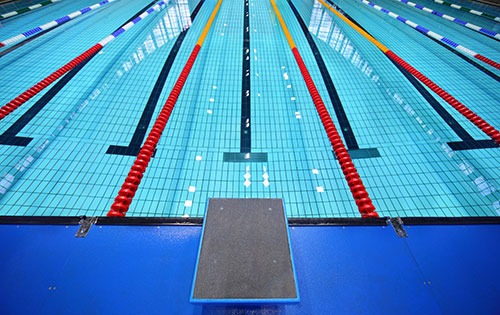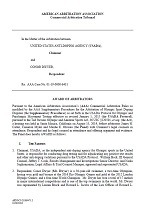 USADA announced today that an independent three-member panel of the American Arbitration Association (AAA) has rendered a decision in the case of swimming athlete Conor Dwyer, of Los Angeles, and has determined that Dwyer should receive a 20-month sanction after testing positive for a prohibited substance.
USADA announced today that an independent three-member panel of the American Arbitration Association (AAA) has rendered a decision in the case of swimming athlete Conor Dwyer, of Los Angeles, and has determined that Dwyer should receive a 20-month sanction after testing positive for a prohibited substance.
Dwyer, 30, tested positive for an anabolic agent as the result of out-of-competition urine samples collected on November 15, November 27, and December 20, 2018. His urine samples were analyzed using a specialized test that differentiates between anabolic-androgenic steroids (AAS) naturally produced by the body and prohibited anabolic agents of external origin. Anabolic agents have powerful performance-enhancing capabilities and can give an athlete an unfair advantage over fellow competitors.
All AAS, including testosterone, are non-Specified Substances in the class of Anabolic Agents and prohibited at all times under the USADA Protocol for Olympic and Paralympic Movement Testing, the United States Olympic and Paralympic Committee National Anti-Doping Policies, and the International Swimming Federation Anti-Doping Rules, all of which have adopted the World Anti-Doping Code and the World Anti-Doping Agency Prohibited List.

Following a full evidentiary hearing, the Panel found that Dwyer had testosterone pellets inserted in his body in violation of the rules.
“As noted in the Panel’s decision, USADA is independent of sport and here to help athletes ensure they compete clean and protect their health and wellbeing within the rules,” said USADA Chief Executive Officer Travis T. Tygart. “It’s frustrating that Mr. Dwyer did not take advantage of this support and hopefully this case will convince others to do so in order to protect fair and healthy competition for all athletes.”
Dwyer’s 20-month period of ineligibility began on December 21, 2018, the date his provisional suspension was imposed. In addition, Dwyer’s competitive results obtained on and subsequent to November 15, 2018, the date his first positive sample was collected, have been disqualified, and any medals, points, and prizes are forfeited.
This decision, as well as other arbitral decisions, can be found here.
In an effort to aid athletes, as well as support team members such as parents and coaches, in understanding the rules applicable to them, USADA provides comprehensive instruction on its website on the testing process and prohibited substances, how to obtain permission to use a necessary medication, and the risks and dangers of taking supplements, as well as performance-enhancing and recreational drugs. If athletes choose to use supplements despite the known risks, USADA has always recommended that athletes use only dietary supplements that have been certified by a third-party program that tests for substances prohibited in sport. USADA currently recognizes NSF Certified for Sport® as the program best suited for athletes to reduce the risk from supplements.
In addition, USADA manages a drug reference hotline, Global Drug Reference Online (www.GlobalDRO.com), conducts educational sessions with National Governing Bodies and their athletes, and distributes a multitude of educational materials, such as an easy-reference wallet card with examples of prohibited and permitted substances, a supplement guide, a nutrition guide, an athlete handbook, and periodic alerts and advisories.
Along with education and testing, robust anti-doping programs enable investigations stemming from tips and whistleblowers. USADA makes available a number of ways to report the abuse of performance-enhancing drugs in sport in an effort to protect clean athletes and promote clean competition. Any tip can be reported using the USADA Play Clean Tip Center, by email at playclean@usada.org, by phone at 1-877-Play Clean (1-877-752-9253) or by mail.
USADA is responsible for the testing and results management process for athletes in the U.S. Olympic and Paralympic Movement and is equally dedicated to preserving the integrity of sport through research initiatives and educational programs.
For more information or media inquiries, click here.



